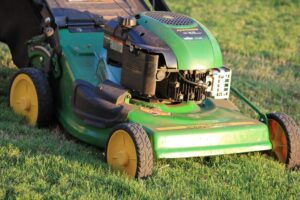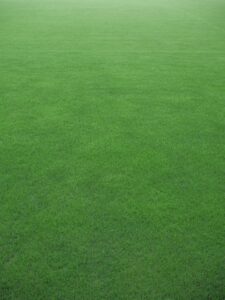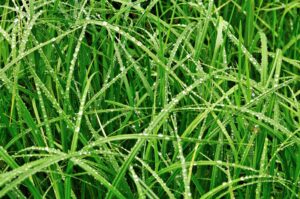Neighbours can convince you to do a lot of things without actually saying a word.
I live in a c.1980s suburban neighbourhood. The subdivision is old enough to have tall trees and individualized house designs, not sub-neighbourhood labels (ex. “The Oaks”) and minuscule yards. Our demographic ranges from middle-class retiree to new family. We moved to the area for the walking paths by the creek, the nearby sports fields and playgrounds, and the close proximity to both an elementary and a high school. (Little did we know then that we would be home educating.) Until a couple of years ago, we could locate within a block every person who had ever lived in our house, except the builder.
 When we first moved in, we saw dandelion-free, green yards and the concrete driveways. Ours had a crack down the middle, but that was no big deal. That first year, we pulled seven large garbage bags full of dandelions from our yard, and raked 25 large garbage bags full of leaves. We watered every few days, edged the driveway once, and mowed once or twice a week. Even then, the summer heat turned the lawn brown and the dandelions didn’t stay away for very long. The next year, we ordered the lawn care program everyone else seemed to be using, and the year after that we had a sprinkler system installed. Thousands of dollars spent on chemicals and water, hours and hours spent on moving sprinklers and mowing, bags and bags of vegetative matter sent to landfill, not to mention sending water loaded with new chemicals from the reservoirs right back into the ground, and that didn’t stop our retired neighbour’s lawn from looking like a golf green next to our spindly mess. Our neighbour edges his lawn twice a week and sprays weeds individually with a spray bottle. The grass really is greener on the other side of the street. Who has that kind of time?
When we first moved in, we saw dandelion-free, green yards and the concrete driveways. Ours had a crack down the middle, but that was no big deal. That first year, we pulled seven large garbage bags full of dandelions from our yard, and raked 25 large garbage bags full of leaves. We watered every few days, edged the driveway once, and mowed once or twice a week. Even then, the summer heat turned the lawn brown and the dandelions didn’t stay away for very long. The next year, we ordered the lawn care program everyone else seemed to be using, and the year after that we had a sprinkler system installed. Thousands of dollars spent on chemicals and water, hours and hours spent on moving sprinklers and mowing, bags and bags of vegetative matter sent to landfill, not to mention sending water loaded with new chemicals from the reservoirs right back into the ground, and that didn’t stop our retired neighbour’s lawn from looking like a golf green next to our spindly mess. Our neighbour edges his lawn twice a week and sprays weeds individually with a spray bottle. The grass really is greener on the other side of the street. Who has that kind of time?
 Since then, after a few years of fruitless efforts, we’ve probably become the black sheep of our block. Not only have we decided to stop running the sprinkler, but we stopped paying for lawn care, pull out dandelions when we can from time to time, and trying desperately to keep our easy-care gardens tidied up, once or twice a year. Mowing happens when we can, or when the tallest shoots start producing seeds. We rake when the leaves have all fallen from the trees, since until then leaves from neighbours’ yards will continue to build up on our lawn. Our driveway now has three major cracks in it, while every other driveway on the street is pristine – most have had their driveways replaced since we moved in. We did replace the roof, but we haven’t pressure-washed our siding. We’re bad, bad neighbours. Hey, at least we don’t use a leaf blower to send the leaves to the lawn next door, as I saw one man doing last year.
Since then, after a few years of fruitless efforts, we’ve probably become the black sheep of our block. Not only have we decided to stop running the sprinkler, but we stopped paying for lawn care, pull out dandelions when we can from time to time, and trying desperately to keep our easy-care gardens tidied up, once or twice a year. Mowing happens when we can, or when the tallest shoots start producing seeds. We rake when the leaves have all fallen from the trees, since until then leaves from neighbours’ yards will continue to build up on our lawn. Our driveway now has three major cracks in it, while every other driveway on the street is pristine – most have had their driveways replaced since we moved in. We did replace the roof, but we haven’t pressure-washed our siding. We’re bad, bad neighbours. Hey, at least we don’t use a leaf blower to send the leaves to the lawn next door, as I saw one man doing last year.
 Why do we do this to ourselves? True, some people enjoy lawn care. Usually it’s people who have a lot of spare time, like our retired neighbours. I read an article recently about how the Western work week is designed to support consumerism. We spend 40 hours or more per week at a job, making the money we need to live in our society, and exhausting bodies and minds. The time left becomes so precious that we want to relax and enjoy our weekends and evenings, and somehow it seems wasteful of that time to spend an entire day hiking or enjoying nature or playing at a park. We seek out quick thrills, usually in the form of movies, sports games, shopping, and such, and then crash hard, sleeping in, watching TV instead of spending quality time with family and doing things that are useful. We’re already fighting a losing battle to try to cram as much life as possible into our off-work hours, and shorting ourselves on sleep in the process; why hold ourselves up to impossibly high standards on top of all that?
Why do we do this to ourselves? True, some people enjoy lawn care. Usually it’s people who have a lot of spare time, like our retired neighbours. I read an article recently about how the Western work week is designed to support consumerism. We spend 40 hours or more per week at a job, making the money we need to live in our society, and exhausting bodies and minds. The time left becomes so precious that we want to relax and enjoy our weekends and evenings, and somehow it seems wasteful of that time to spend an entire day hiking or enjoying nature or playing at a park. We seek out quick thrills, usually in the form of movies, sports games, shopping, and such, and then crash hard, sleeping in, watching TV instead of spending quality time with family and doing things that are useful. We’re already fighting a losing battle to try to cram as much life as possible into our off-work hours, and shorting ourselves on sleep in the process; why hold ourselves up to impossibly high standards on top of all that?
Aside from our personal well-being, there are some other important reasons not to push so hard to meet the standard of a pristine lawn and house:
- Lawn chemicals, while regulated to be less harmful than in the past (in a lot of places), are still harmful to the environment. Everything applied to your lawn eventually gets washed down into the soil. From the soil, it moves into ground water and waterways, carrying many of the dissolved chemicals and nutrients along for the ride. In bodies of natural water, these chemicals affect the natural balances of plant and animal life, including bacteria and oxygen content. Sometimes they cause toxic conditions. Other times, the chemicals are taken up by the plants and animals living in the water, and can reenter our own food chain, as well as harming other animals further up the food chain, in which chemicals can accumulate. In ground water and reservoirs, these chemicals can reenter our drinking water supply, requiring more water treatment energy and chemicals, and making their way into our bodies by way of our faucets. Yes, some degrade as they move through the water cycle, but the result is still an increased chemical load on our environment.
- Watering our lawns from municipal water supplies and ground water supplies such as wells lowers our reservoirs and water table, leaving less, especially during times of drought, for its primary purposes: Drinking and washing. This is why most towns and cities have watering schedules or bans.
- Grass doesn’t do much for our environment. Sure, photosynthesis turns carbon dioxide and sunlight into oxygen and sugars, but trees store a lot more carbon than grass, as well as providing shade, and vegetables and fruit provide a source of food. Grass just needs mowing to look neat. The more you water, the more you have to burn fossil fuels or use electricity and spend time mowing. Then most people send the grass to the dump. Composting or mulching is better, but it still seems counterproductive. During dry conditions, cutting grass short can actually kill the grass. If you want to have grass, why hurt it when it’s already suffering?
- For those whose municipalities make them take charge of their own yard waste, it’s a lot easier to make one trip to a compost depot with a lot of leaves or grass than a small trip multiple times a week. Plus you use less gas.
- If you do it, someone else will probably start doing it, too. Next thing you know, it’s not just the impact of your own actions that’s affecting the Earth, but those of your friends and neighbours.
- Spending time with family and friends is more important than looking perfect all the time. Really.
 I hope I’ve convinced at least a few people to relax a little on their lawn care and stop perpetuating impossible yard care standards. I’m not saying you should leave your grass to grow two feet tall or stop cleaning up garbage on your lawn, but you and the environment are worth taking a step back every once in a while.
I hope I’ve convinced at least a few people to relax a little on their lawn care and stop perpetuating impossible yard care standards. I’m not saying you should leave your grass to grow two feet tall or stop cleaning up garbage on your lawn, but you and the environment are worth taking a step back every once in a while.
What reasons do you have for letting go of keeping up with the Joneses? Comment below.
